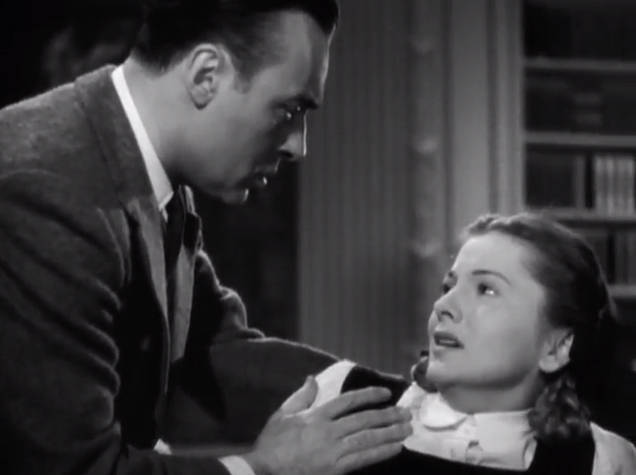Update 11 August 2017: This was published by mistake before it was done but I figure i am just going to leave it as a work in progress. I just completed TCM Presents The Master of Suspense: 50 Years of Hitchcock online course. I’m just throwing out an idea out here and that’s Girls Who Wear Glasses (GWWG) as a motif. Considering that one of them is Hitchcock’s own daughter Patricia, and it appears about as often as paintings, it’s significant, but it doesn’t really get talked about…not that I saw anyway.
Tag: joan fontaine
The Great Debate Blogathon: THE CONSTANT NYMPH (1943)
The practice of “hate-watching” is not one I really understand. I don’t judge or begrudge anyone who does it, but my standard reaction to coming across a movie, TV show, or song on the radio that I don’t like is to change the channel. My knowledge of filmmaking is nothing like encyclopedic, but I know enough about it to understand that a movie of any quality is a synthesis of many different individuals’ ideas and expertise into a collective whole, and that getting any movie made is nothing short of a small miracle. My respect for anyone who has actually made a movie generally keeps me from saying a lot of negative things about the result or the people involved.
However, all of my equanimity goes out the window when the movie concerned is The Constant Nymph. For those who haven’t seen it:
Fourteen-year-old Tessa (Joan Fontaine) is hopelessly in love with handsome composer Lewis Dodd (Charles Boyer), a family friend. Lewis adores Tessa, but has never shown any romantic feelings toward her. When Tessa’s father dies, Lewis contacts her late mother’s wealthy family so they’ll take care of Tessa and her sisters. Lewis becomes taken with Tessa’s haughty cousin Florence (Alexis Smith) and the two soon marry and head off for Florence’s estate in England. Meanwhile, Florence sends Tessa and her sister Paula (Joyce Reynolds) off to finishing school. The girls run away from school and Tessa moves in with Florence and Lewis. Florence soon becomes consumed with jealousy over the bond between her husband and Tessa. (via IMDB)
This is the film I named as my pet peeve in a recent TCM Party podcast, and after a re-watch, I can tell you, that opinion stands. I know the majority is against me here, including lead actress Joan Fontaine herself; per several sources, this was her favorite of her films. But I just don’t like it.
The odd part about it is, The Constant Nymph has all the ingredients to be a favorite of mine too. I adore both Fontaine and Alexis Smith, and the supporting cast includes three of the best character actors ever, Charles Coburn, Peter Lorre, and Dame May Whitty, though she isn’t given a whole lot to do.
Behind the camera were some of the pre-eminent pros of the studio era. Cinematographer Tony Gaudio shot so many of my most-liked pictures that he could easily hijack this post — including, but not limited to, The Adventures of Robin Hood, Dawn Patrol, and The Letter (1940). Orry-Kelly designed the gowns. Erich Wolfgang Korngold wrote the score. And the director, Edmund Goulding, also helmed Grand Hotel (1932), Dark Victory, and Dawn Patrol, with uncredited stints on Queen Kelly and Hell’s Angels. (Yes, I have a thing for Dawn Patrol. So sue me. Have you seen Errol Flynn in it?)
So what happened? Why do I feel that the befuddled doctor’s statement “It is my opinion that you are much more than slightly mad” applies to anyone who would sit through Constant Nymph a second time?
 To begin with, teenaged Tessa is, to me, a very rare misfire for Fontaine. She is beautiful in a fresh, unspoiled way, lively and mischievous. She just doesn’t seem like a teenager. I know times are different now and maybe that’s why. But I find her character grating and excessively artificial, and she’s in almost every scene. Her sister Paula’s assertion, “The way you moon over [Dodd], it’s enough to turn one’s stomach” is unfortunately true for this viewer.
To begin with, teenaged Tessa is, to me, a very rare misfire for Fontaine. She is beautiful in a fresh, unspoiled way, lively and mischievous. She just doesn’t seem like a teenager. I know times are different now and maybe that’s why. But I find her character grating and excessively artificial, and she’s in almost every scene. Her sister Paula’s assertion, “The way you moon over [Dodd], it’s enough to turn one’s stomach” is unfortunately true for this viewer.
(As played by Joyce Reynolds, this Paula acquits herself fairly well compared with other characters that share my name. It’s a known fact that vast majority of them are awful. I confess it’s nice hearing Fontaine bawl out my name, though I much prefer Ronald Colman in Random Harvest.)
In addition, though as I said, times have changed, Tessa’s extreme youth makes the romance a little cringe-y to me. I’m not sure how old Dodd is supposed to be, which could be a oversight on my part, but Tessa is only 14 at the beginning of the film, and only months later becomes a real rival to her cousin.
Ironically enough, I somewhat agree with Charles Boyer’s assessment of Constant Nymph. To paraphrase his biographer, his objections to the script were that the positive qualities other characters attributed to Lewis Dodd simply were not present in the role as written, and that Florence was such an unsympathetic character that it made the whole love triangle questionable. Yes. And maybe.
I will admit that Boyer has never been a favorite of mine. Though Gaslight was released in 1944, the year after CN, I saw that film several times before I’d ever heard of CN, and perhaps I’ve never been able to forgive him. His character is ostensibly presented as a composer, Lewis Dodd. By that I mean, a grandiose, parasitic freeloader with adulterous tendencies. The whole film hinges on Dodd getting his creative mojo back…but he’s so narcissistic and pretentious that I can’t bring myself to care.
Tessa herself is also problematic. It’s all about her, so much so that once she knows she’s come between them, her reaction is to confess her love and her concern for her effect on the marriage comes off as false. And Dodd, as an ostensible adult, is even worse, saying he has no idea why he married Florence.
 In short, Dodd and Tessa deserve each other. I have some sympathy for Florence, who is supposed to be a cold-hearted shrew, which is greatly to Alexis Smith’s credit…I just can’t figure out why she cares about a louse like Dodd. Another sympathetic character is Peter Lorre’s Fritz Bercovy, a basically decent, sane guy, who marries into this mess, courtesy of a union with another of Tessa’s sisters, Toni (Brenda Marshall).
In short, Dodd and Tessa deserve each other. I have some sympathy for Florence, who is supposed to be a cold-hearted shrew, which is greatly to Alexis Smith’s credit…I just can’t figure out why she cares about a louse like Dodd. Another sympathetic character is Peter Lorre’s Fritz Bercovy, a basically decent, sane guy, who marries into this mess, courtesy of a union with another of Tessa’s sisters, Toni (Brenda Marshall).
Interestingly, both Flynn and Leslie Howard were considered for Dodd role, and though I love them both, I can’t imagine that either could have saved this for me. I might like it a little more, but I still wouldn’t seek it out.
Given the love evident on Twitter every time TCM schedules The Constant Nymph, I can only conclude that my opinion of it places me in the tiniest of minorities, although at the time, it was popular flop and a critical success. But if we all agreed on everything, the world would be a very boring place indeed. So enjoy it in all its glory…I’ll be catching up on my DVR queue.
This post is part of the The Great Debate Blogathon hosted by Citizen Screenings and The Cinematic Packrat. Be sure and check out the other posts here.

